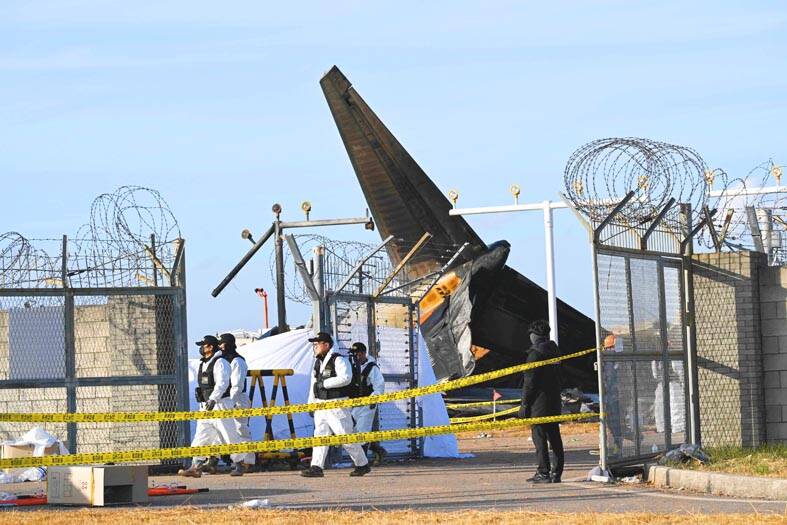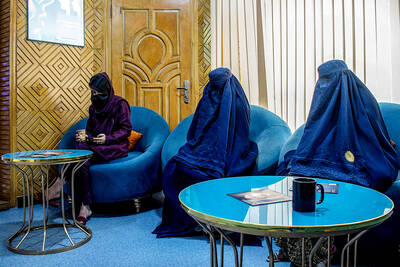The initial results of an investigation into a devastating Jeju Air crash in South Korea in December last year showed that, while the plane’s both engines sustained bird strikes, its pilots turned off the less-damaged one just before its crash-landing.
The finding, which implied human errors, drew quick, vehement protests from bereaved families and fellow pilots who accuse authorities of trying to shift responsibility for the disaster to the dead pilots.
South Korea’s Aviation and Railway Accident Investigation Board initially planned to publish the results of an investigation of the plane’s engines on Saturday, but it was forced to cancel its news conference in the face of strong protests by relatives of crash victims who were informed of the findings earlier in the day, according to government officials and bereaved families.

Photo: AFP
“If they want to say their investigation was done in a reliable, independent manner, they should have come up with evidence that backs up their explanation,” said Kim Yu-jin, head of an association of bereaved families. “None of us resent the pilots.”
The Boeing 737-800 operated by Jeju Air landed on its belly without its landing gear deployed at South Korea’s southern Muan International Airport on Dec. 29 last year.
It overshot a runaway, slammed into a concrete structure and burst into flames. It was the deadliest disaster in South Korea’s aviation history in decades, killing all but two of the 181 people on board.
According to a copy of an unpublished briefing report, a South Korean-led multilateral investigation team said it found no defects in the plane’s engines built by France’s Safran and GE.
The report said that thorough examinations of the engines found the plane’s right engine sustained more serious internal damage following bird strikes as it was engulfed with big fires and black smoke.
However, the pilots switched off the plane’s left engine, the report said, citing probes on the cockpit voice recorder, the flight data recorder and the engine examinations.
Officials earlier said that the black boxes of the Boeing jetliner stopped recording about four minutes before the crash, complicating investigations into the cause of the disaster.
The cockpit voice recorder and the flight data recorder cited in the briefing report refers to data stored before the recording stopped.
The report did not say why the pilots shut off the less-damaged engine and stopped short of saying whether it was an error by the pilots.
Bereaved families, and pilots at Jeju Air and other airlines, lambasted the investigation findings, saying that authorities must disclose the cockpit voice recorder and the flight data recorder.
“We, the 6,500 pilots at civilian airlines, can’t contain our seething anger against the preposterous argument by the Aviation and Railway Accident Investigation Board that lost neutrality,” the Seoul-based Korean Pilot Unions Alliance said in a statement on Tuesday.
Unionized pilots at Jeju Air also issued a statement urging authorities to present scientific evidence to show the plane should have landed normally if it flew with the less-damaged engine.
The latest report focused only on engine issues and did not mention other factors that could also be blamed for the crash. Among them is the concrete structure the plane crashed into. It housed a set of antennas called localizers designed to guide aircraft safely during landings.
Analysts say it should have been made with more easily breakable materials.
Some pilots say they suspect the government would not want to mainly and prominently blame the localizers or bird strikes for mass deaths, as Muan airport is under direct management of the South Korean Ministry of Land, Infrastructure and Transport.
Kwon Bo-hun, dean of Aeronautics College at Far East University in South Korea, called the engine investigation report “clumsy” because it did not disclose evidence that supported its finding on the pilots.
Kwon said it only irritated “emotional parts of us,” as the investigation raised suspicions that it puts the whole blame on the dead pilots.

DEADLOCK: Putin has vowed to continue fighting unless Ukraine cedes more land, while talks have been paused with no immediate results expected, the Kremlin said Russia on Friday said that peace talks with Kyiv were on “pause” as Ukrainian President Volodymyr Zelenskiy warned that Russian President Vladimir Putin still wanted to capture the whole of Ukraine. Meanwhile, US President Donald Trump said that he was running out of patience with Putin, and the NATO alliance said it would bolster its eastern front after Russian drones were shot down in Polish airspace this week. The latest blow to faltering diplomacy came as Russia’s army staged major military drills with its key ally Belarus. Despite Trump forcing the warring sides to hold direct talks and hosting Putin in Alaska, there

North Korea has executed people for watching or distributing foreign television shows, including popular South Korean dramas, as part of an intensifying crackdown on personal freedoms, a UN human rights report said on Friday. Surveillance has grown more pervasive since 2014 with the help of new technologies, while punishments have become harsher — including the introduction of the death penalty for offences such as sharing foreign TV dramas, the report said. The curbs make North Korea the most restrictive country in the world, said the 14-page UN report, which was based on interviews with more than 300 witnesses and victims who had

COMFORT WOMEN CLASH: Japan has strongly rejected South Korean court rulings ordering the government to provide reparations to Korean victims of sexual slavery The Japanese government yesterday defended its stance on wartime sexual slavery and described South Korean court rulings ordering Japanese compensation as violations of international law, after UN investigators criticized Tokyo for failing to ensure truth-finding and reparations for the victims. In its own response to UN human rights rapporteurs, South Korea called on Japan to “squarely face up to our painful history” and cited how Tokyo’s refusal to comply with court orders have denied the victims payment. The statements underscored how the two Asian US allies still hold key differences on the issue, even as they pause their on-and-off disputes over historical

Decked out with fake crystal chandeliers and velvet sofas, cosmetic surgery clinics in Afghanistan’s capital are a world away from the austerity of Taliban rule, where Botox, lip filler and hair transplants reign. Despite the Taliban authorities’ strict theocratic rule, and prevailing conservatism and poverty in Afghanistan, the 20 or so clinics in Kabul have flourished since the end of decades of war in the country. Foreign doctors, especially from Turkey, travel to Kabul to train Afghans, who equally undertake internships in Istanbul, while equipment is imported from Asia or Europe. In the waiting rooms, the clientele is often well-off and includes men